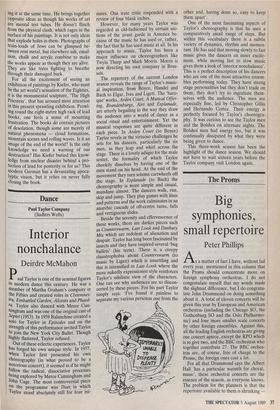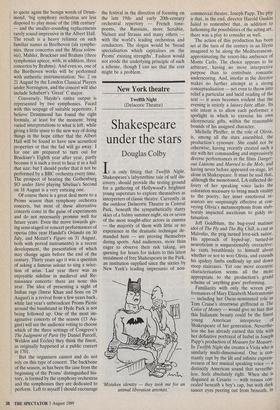The Proms
Big symphonies, small repertoire
Peter Phillips
As a matter of fact I have, without fail every year, mentioned in this column that the Proms should concentrate more on foreign symphony orchestras. I do not congratulate myself that my words made the slightest difference, but I do congratu- late John Drummond on doing something about it. A total of eleven concerts will be given this year by European and American orchestras (including the Chicago SO, the Gothenburg SO and the Oslo Philharmo- nic) and four more smaller scale concerts by other foreign ensembles. Against this, all the leading English orchestras are giving one concert apiece, except the RPO which is to give two, and the BBC orchestras who together contribute 27. The BBC orches- tras are, of course, free of charge to the Proms; the foreign ones cost a lot.
For all that Drummond says the Albert Hall 'has a particular warmth for choral, music', these orchestral concerts are the essence of the season, as everyone knows. The problem for the planners is that the repertoire available to them is shrinking — to quote again the benign words of Drum- mond, 'big symphony orchestras are less disposed to play music of the 18th century' — and the smaller-sounding replacements rarely sound impressive in the Albert Hall. The result is a heavy reliance on such familiar names as Beethoven (six sympho- nies, three concertos and the Missa solem- nis), Mahler, Bruckner and Brahms (three symphonies apiece, with, in addition, three concertos by Brahms). And even so, one of the Beethoven works will be performed with authentic instrumentation: No. 2 on 21 August by the London Classical Players under Norrington, and the concert will also include Schubert's 'Great' C major.
Conversely, Haydn's entire output is represented by two symphonies. Faced with this seepage of suitable repertoire, I believe Drummond has found the right formula, at least for the moment: bring varied interpretations to what is left, while giving a little space to the new way of doing things in the hope either that the Albert Hall will be found to have new acoustical properties or that the fad will go away. I for one am prepared to turn out for Bruckner's Eighth year after year, partly because it is such a treat to hear it in a hall that size; but I should prefer that it not be performed by a BBC orchestra every time. The prospect of hearing the Gothenburg SO under Jarvi playing Sibelius's Second on 18 August is a very enticing one.
Of course there is a great deal more to a Proms season than symphony orchestra concerts, but most of these alternative concerts come in the guise of experiments and do not necessarily promise well for future years. Even the move towards giv- ing semi-staged or concert performances of operas (this year Handel's Orlando on 30 July, and Mozart's Figaro on 31 August, both with period instruments) is a recent development, the presentation of which may change again before the end of the century. Thirty years ago it was a question of asking a famous soloist to sing a selec- tion of arias. Last year there was an enjoyable sideline in medieval, and Re- naissance concerts: there are none this year. The idea of presenting a night of Indian rags (Imrat Khan and Sons on 29 August) is a revival from a few years back, while last year's unbroadcast Proms Picnic around the bandstand in Hyde Park is not being followed up. One of the most im- aginative concerts of the season (13 Au- gust) will see the audience voting to choose which of the three settings of Congreve's The Judgment of Paris (by Daniel Purcell, Weldon and Eccles) they think the finest, as originally happened at a public concert in 1701.
But the organisers cannot and do not rely on this type of concert. The backbone of the season, as has been the case from the beginning of the Proms' distinguished his- tory, is formed by the symphony orchestras and the symphonies they are dedicated to perform. Left to myself I should encourage the festival in the direction of focusing on the late 19th- and early 20th-century orchestral repertory — French tone- poems, the Russians, more Scriabin, Nielsen and Strauss and many others --- with the world's leading orchestras and conductors. The slogan would be 'broad specialisation which capitalises on the Proms' existing strengths'. Fashion would not erode the underlying principle of such a scheme, though I can see that the cost might be a problem.



















































 Previous page
Previous page